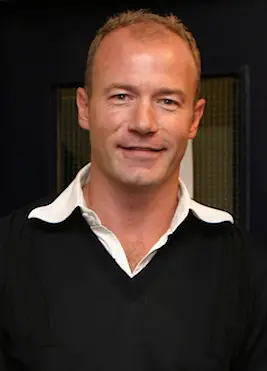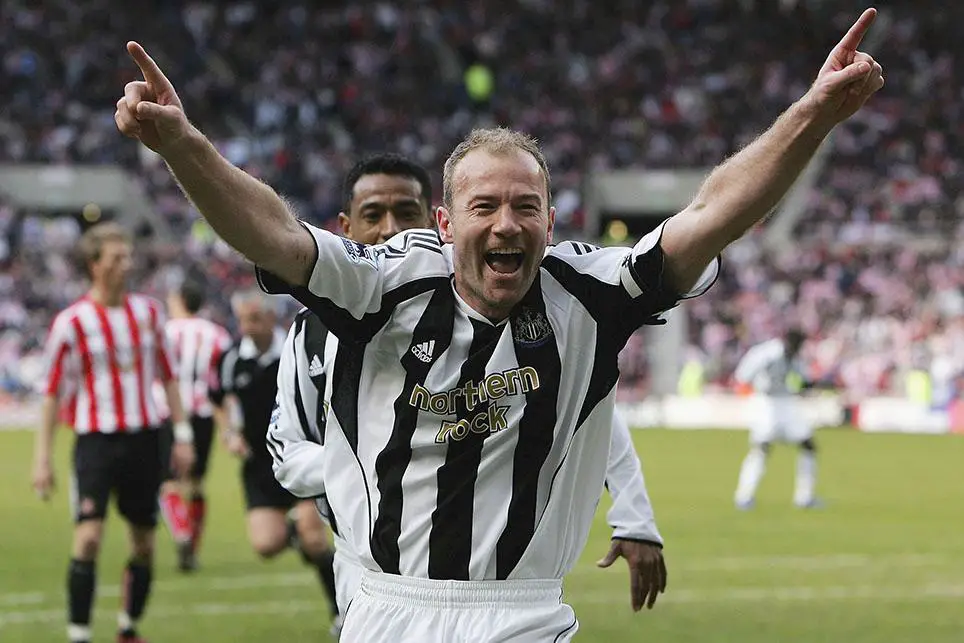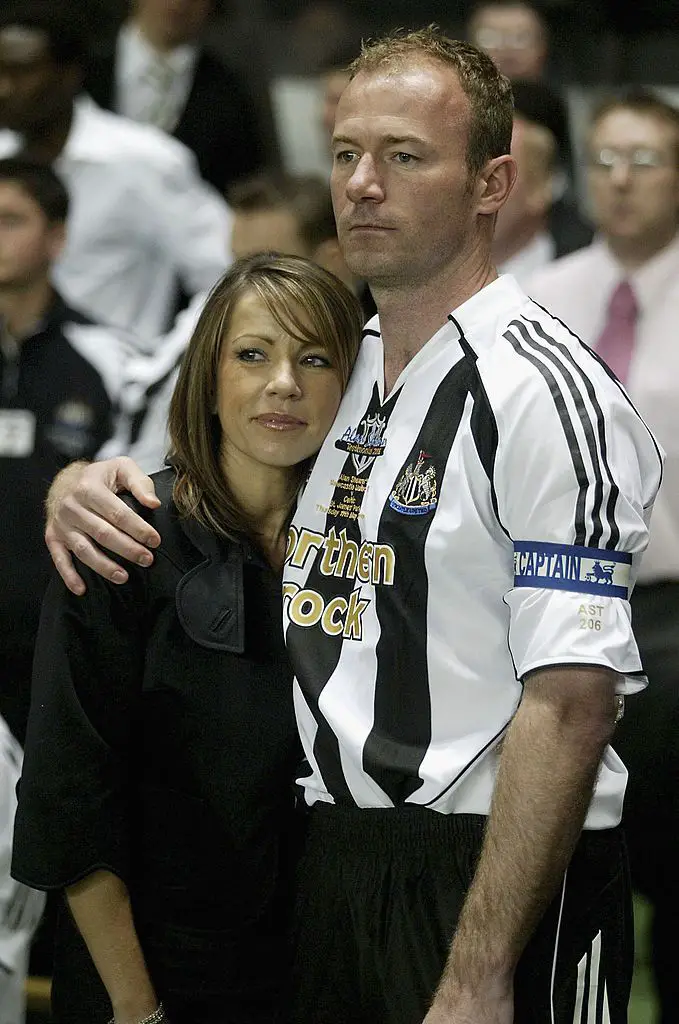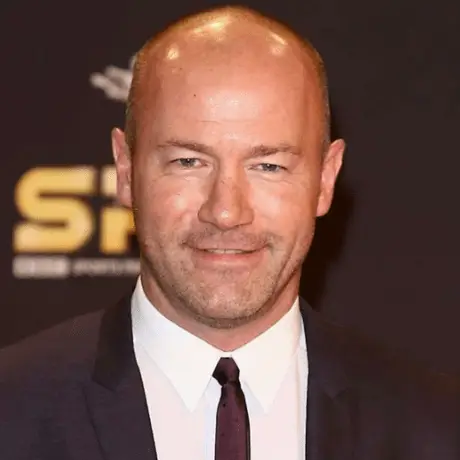Alan Shearer is a former English professional footballer who spent most of his career as a striker for the England junior and senior national teams. During his career, he has represented a number of well-known clubs, including Wallsend Boys Club, Southampton, and Blackburn Rovers. At the time of his retirement, he was a member of Newcastle United FC, a popular top-tier English club.
Table of Contents
Alan Shearer’s Bio
| Name | Alan Shearer |
| Date of Birth | August 13, 1970 |
| Birth Place | Gosforth, Newcastle upon Tyne, England |
| Age | 50 |
| Parents | Anne, Alan Shearer |
| Nationality | England |
| Gender | Male |
| Religion | Christian |
| Ethnicity | White |
| Residence | Runnymede Road in Darras Hall |
| Source of wealth | Football, Television |
| Height | 6′ 0″ (1.83 m) |
| Weight | 174 lbs (78.91 kg) |
| Education | Gosforth High School, Central Middle School |
| occupation | Retired Professional Footballer, Football Pundit |
| Net worth | $51 million |
| Product Endorsements | Northern Rock & Adidas |
| Sexual Orientation | Straight |
| Marital Status | Married (Lainya) |
| Children | 3 (Hollie, Will, Chloe) |
Alan Shearer’s Early Life
Alan Shearer was born on August 13, 1971, in Newcastle upon Tyne, more specifically in the working-class suburb of Gosforth. From a young age, his father Alan, a metal worker, encouraged him to play football. Throughout his school years, he continued to play.
Alan grew up as a midfielder in the local clubs. Before joining the Wallsend Boys as a teenager, he became captain of his school team, The Newcastle City School, and helped them win a youth tournament at St James’ Park. During this time, he was discovered by Southampton scout Jack Hixon, who convinced him to spend the summer training with the club’s youth teams.
In April 1986, he stayed on and signed his first youth contract. Alan had previously failed trials with West Bromwich Albion, Manchester City, and Newcastle United.
At the age of 15, Shearer, who was playing for Wallsend Boys Club at the time, had a trial with Newcastle United, where he almost exclusively presented himself as a goalkeeper. After being rejected by Newcastle United, he joined Southampton FC’s youth team; his decision to move from the north-east to the south coast of England was influenced by the fact that many other young players had taken the same route.
He scored a hat-trick on his Southampton debut against Arsenal when he was 17 years old in 1988, and went on to become the first player in Premier League history to score 30 goals in three consecutive seasons. In 1992, he moved to Blackburn Rovers from Southampton for a then-record £3.6 million fee. At the age of 12, he was captain of his high school football team.
Alan Shearer’s net worth?
Alan Shearer’s net worth is estimated to be around £40 million ($50.1 million).
He is still trailing former footballer and Match of the Day host Gary Lineker, who is said to earn nearly four times Shearer’s annual salary of £1.8 million ($2.3 million).
Shearer is said to earn £450,000 ($580,000) per year as a BBC football pundit, mostly on the Match of the Day show.
Along with his role as a pundit, he also served as Newcastle’s interim manager at the end of the 2008-09 season.
Professional Career

Alan made his senior professional debut for Southampton in a First Division match against Chelsea on March 26, 1988, as a substitute. His exceptional ball-controlling abilities quickly cemented his place in the club’s best squad. He appeared in 118 games for the club, scoring 23 goals.
Alan Shearer was sold to Blackburn Rovers in Lancashire for a world record fee of £3.6 million in 1992. In his first season, he scored 16 goals in 21 games, putting him on the map. Shearer scored 31 goals in 40 games the following season, helping the club to finish runners-up in the Premier League. For that season, he was named Football Writers’ Association Footballer of the Year.
In the 1994-95 season, he led the team to the Premier League title, defeating Manchester United in the finals, and was named PFA Player of the Year. He appeared in 138 games for the club, scoring 112 goals.
Shearer joined his hometown club and then-league runners-up Newcastle United for a world transfer record-breaking £15 million in 1996. He made his debut against Everton on the road and went on to be the league’s top scorer in his first season with the club. In 1996, he was named PFA Player of the Year for the second time.
Shearer’s hat-trick in the Champions League against Bayer Leverkusen in 2002 helped the club reach the Premier League semi-finals.

Alan Shearer in 303 games for Newcastle, scoring 148 goals in the process.
Shearer (17 years, 240 days) scored a hat-trick against Arsenal in a 4-2 victory, breaking Jimmy Greaves’ 30-year–old record as the youngest player to score a hat-trick in the Premier League. In 1991, he was named Player of the Year for his achievements with Southampton.
Shearer scored the game-winning goal in a semi-final win over Sheffield United in 1997. The following season, he scored twice in the semi-final against Tottenham Hotspur to help Newcastle reach their second consecutive FA Cup final.
International Career
Shearer made his international debut for England’s U21 squad in 1990. In 11 games, he scored 13 goals and proved his worth. In 1992, he was promoted to England’s B team and made his debut in a 2-0 win over France. Due to his outstanding performances at Euro 1996, he quickly rose to the core national team and was named to the official UEFA team of the tournament.
Alan Shearer’s Wife
While playing for Southampton, he met his future wife, Lainya. During his second year at the club, they lived in the city with her parents and married on June 8, 1991 at St. James’ Church. They are the parents of three children. He has a son and two daughters, Chloe and Hollie. Shearer’s wife has been described as a quiet and reserved individual who is uncomfortable with the public attention that his celebrity brings.

He cited not wanting to uproot his family as a major factor in his decision to stay in England throughout his career, despite the fact that he had the option of moving to Juventus or Barcelona after leaving Blackburn. Following his testimonial match in May 2006, his family accompanied him onto the pitch at St James’ Park, where he performed a lap of honour.
Alan Shearer’s life after football
Shearer joined the BBC as a pundit after hanging up his shooting boots. The majority of his work has revolved around Gary Lineker’s weekly highlight show ‘Match of the Day,’ though he has also contributed to live tournament coverage. Until the BBC’s recent efforts to close the gender pay gap, the former Toon legend was earning £445k per year from his BBC contract. Despite the loss of £50,000 per year, he still has a contract worth £395,000.
However, his work in the media isn’t limited to television. He recently announced that he has joined ‘The Athletic,’ a sports subscription site. It’s unclear how this will affect his net worth, but given his reputation in the industry, it’s safe to say he won’t be working for peanuts.
However, since retirement, it hasn’t always been all punditry and opinion work. Shearer did get a taste of management in 2009, when his beloved Newcastle were in a precarious situation. He was only in charge for eight games, and the team was relegated as a result of only one win during that time. However, it’s difficult to place too much blame on Shearer.
Finally, there is Shearer’s involvement in charity work. Many former players participate in charity events, such as Socceraid, and Shearer is no exception, but he also does a lot more. During his time in Newcastle, he received a testimonial and used the proceeds to establish the Alan Shearer Foundation, a charity that helps disabled people. In 2016, he was given a CBE as part of the Queen’s honours list.

Alan Shearer’s presence on Social Media
As a Former football legend Alan Shearer is very active and popular figure in social media platforms. He has a sizable fan-base on his personal social media handles. Specifically, he has more than 655k followers followers on his personal verified Instagram account. Likewise, he has over
905.3k Twitter followers as well.
| @alanshearer | |
| @alanshearer |
Trivia
- He was the tournament’s top goal scorer with five goals in five games for England at UEFA Euro ’96.
- He was a pro at taking penalties.
- He debuted for England in 1992, was named national captain in 1996, and retired from international competition in 2000.
- In 63 international appearances, he scored 30 goals.
- At Euro ’96, he scored in England’s 1-1 draw with Switzerland, a strong header in the 2-0 victory over Scotland, two goals against Holland (one of which was a penalty), and a header against Germany in the 1-1 semi-final.
- In four games at the 1998 World Cup, he scored two goals: a header against Tunisia and a penalty against Argentina.
- He scored the game-winning header against Germany in the 1-0 win for England at Euro 2000, as well as a penalty against Romania.
- In the tradition of Bobby Charlton and Gary Lineker, he wore the number 9 shirt for England.
- West Bromwich Albion, Sunderland, and Manchester City were among the clubs who passed up the chance to sign Alan Shearer when he was a teenager. Manchester United, on the other hand, tried twice to sign him before sending him to Blackburn and Newcastle in 1992 and 1996, respectively.
- Newcastle United offered him a trial before he signed with Southampton, but they didn’t recognize his talent as a forward and instead put him in goal.
- He was named player/coach at Newcastle United for the 2005-2006 season in April 2005.
- To his embarrassment, he was consistently voted Britain’s hunkiest footballer.
- He has won the Premier League Golden Boot three times (highest goal scorer).
- Northumberland is a county in the English county of Northumberland. [In May of 2009]
- In the 2016 Queen’s Birthday Honours List, he was awarded the CBE (Commander of the Order of the British Empire) for his charitable services to the community in North East England. He resides in the English town of Ponteland, in the county of Tyne and Wear.
- He has led the England football team as captain. When he moved from Blackburn to Newcastle for £15 million in the summer of 1996, he was the most expensive footballer in the world.
- In the 2001 Queen’s Birthday Honors List, he was awarded the OBE (Officer of the Order of the British Empire) for his contributions to sports.

